
- Aug 19, 2025
- 8 min read
Should You Handle Repatriation Yourself? A Family's Critical Decision Guide
When the embassy calls to inform you that your loved one has died in a foreign country, you’re immediately thrust into a complex international bureaucratic process that involves navigating fifteen to thirty different government agencies, each with their own requirements, documentation standards, and processing timelines that can extend your family’s suffering for weeks if not handled with precision and expertise.
The fundamental question every family faces is whether to commit the next two weeks of their lives to learning and navigating an international legal and logistical maze they’ll hopefully never encounter again, or to transfer this burden to specialists who have successfully managed this exact process over 500 times across 47 countries, each time identifying and avoiding the specific pitfalls that can add thousands of dollars and precious days to an already traumatic experience.
This decision isn’t merely about saving money—it’s about preserving your family’s emotional resources during the most difficult period of your lives, ensuring your loved one receives dignified care throughout the process, and avoiding the devastating delays that occur when inexperienced families encounter the countless bureaucratic obstacles that international repatriation inevitably presents.
Understanding the Two Distinct Pathways Forward
Professional management through Memorial Industries means making a single phone call that immediately transfers the entire coordination burden to specialists who maintain established relationships with vetted providers in forty-seven countries, possess comprehensive knowledge of country-specific requirements and cultural protocols, and have developed streamlined processes that typically bring your loved one home within five to seven days while keeping your family informed without overwhelming you with operational details.
Self-management requires you to personally coordinate with the foreign hospital or morgue to ensure proper refrigerated storage while simultaneously navigating the local police bureaucracy for death investigation clearance, working with the US Embassy’s consular section to obtain the official Consular Report of Death, engaging with the foreign country’s health ministry for export permits, coordinating with certified translation services for legal document conversion, arranging for embalming or body preparation that meets both local and international transport standards, securing appropriate shipping containers that comply with IATA regulations, booking cargo space on airlines that are certified to transport human remains, and managing customs clearance procedures on both ends of the journey.
The critical difference between these approaches extends far beyond convenience—professional management leverages established relationships, regulatory expertise, and operational systems that have been refined through hundreds of successful repatriations, while self-management forces grieving families to learn complex international procedures under extreme time pressure while making costly mistakes that specialists have learned to avoid through years of experience.
The Hidden Complexity of Self-Managed Repatriation
Families who attempt to coordinate repatriation themselves quickly discover that the process involves far more than simply ‘shipping a body home,’ requiring them to navigate intricate webs of international regulations that vary dramatically between countries, with each jurisdiction maintaining different requirements for documentation, health certifications, religious considerations, and transport protocols that can create weeks of delays if not properly understood and executed.
The logistical coordination alone demands that families simultaneously manage relationships with funeral directors who may not speak English fluently, embassy officials operating under strict governmental protocols, airline cargo departments with limited availability for human remains transport, insurance companies requiring specific documentation formats, and translation services that must produce legally certified documents within impossibly tight timeframes.
Most families underestimate the psychological toll of spending ten to fifteen hours daily on international phone calls, often conducted in the middle of the night due to time zone differences, while repeatedly explaining their tragic circumstances to bureaucratic officials who treat their case as routine paperwork rather than a family emergency requiring compassionate urgency.
Storage fees accumulate at rates of $150 to $300 per day while families struggle through bureaucratic delays, and these costs compound quickly when document rejections require starting entire approval processes over again, often because families lack the specialized knowledge to anticipate which specific stamps, seals, or formatting requirements each agency demands.
Circumstances Where Self-Management Might Succeed
Self-managed repatriation becomes viable when the death occurs in countries with streamlined English-language processes, such as the United Kingdom or Australia, where bureaucratic procedures closely mirror American systems and where language barriers don’t complicate already complex communications with multiple government agencies.
Families with extensive international business experience, fluency in the local language, and the ability to dedicate multiple family members to full-time coordination for two weeks may successfully navigate the process, particularly when they possess the financial resources to absorb unexpected delays and cost overruns without creating additional family stress.
The key success factors include having at least two family members who can take extended leave from work, access to $25,000 in immediately available funds to cover unexpected expenses and delays, previous experience navigating complex international bureaucracy, and most importantly, the emotional resilience to handle repeated setbacks and frustrations while grieving the loss of a loved one.
However, even families who meet these criteria often discover that the time, energy, and emotional resources consumed by self-management could have been better preserved for the essential work of grieving, supporting other family members, and beginning the healing process that follows any significant loss.
When Professional Intervention Becomes Essential
Memorial Industries’ intervention becomes absolutely critical when death occurs in countries with complex regulatory environments like Thailand, where the Ministry of Foreign Affairs requires document legalization that can take five to seven days if not expedited through proper diplomatic channels that we maintain through our established Bangkok operations team.
Our services prove invaluable in Mexico, where repatriation success depends on understanding the intricate differences between state and federal health department requirements, knowing which specific officials have authority to expedite permits, and maintaining relationships with the limited number of funeral providers who consistently deliver quality services that meet both Mexican export standards and US import requirements.
Language barriers that seem manageable during initial conversations become insurmountable obstacles when families must communicate complex legal requirements, technical specifications for body preparation, or urgent timeline changes to providers who speak limited English and operate within cultural contexts that may not prioritize the rapid timelines that American families expect.
Religious timing requirements, particularly the Jewish and Islamic traditions requiring burial within 24 to 48 hours, create impossible conflicts with standard international repatriation timelines unless managed by specialists who have developed specific protocols for expediting documentation, coordinating with religious authorities in both countries, and arranging emergency transport schedules that honor religious obligations while meeting regulatory requirements.
Families scattered across multiple geographic locations cannot effectively coordinate the intensive daily management that repatriation requires, and the resulting communication breakdowns typically lead to missed deadlines, conflicting instructions to overseas providers, and costly delays that could easily have been avoided through centralized professional coordination.
Memorial Industries’ Distinctive Operational Advantages
Memorial Industries maintains direct partnerships with vetted funeral service providers in forty-seven countries who have demonstrated their ability to meet our exacting standards for dignified care, regulatory compliance, and timeline adherence—relationships that we’ve built through seven years of successful repatriations and that enable us to immediately mobilize local resources, secure priority processing for urgent documents, and guarantee proper preservation and preparation of remains according to both religious requirements and international transport regulations.
Our insurance recovery specialists understand the precise documentation requirements, submission procedures, and appeal processes for seventeen major travel insurance carriers and forty-three credit card companies that provide death benefit coverage, enabling us to recover an average of $7,200 in additional benefits per family through proper claim presentation, comprehensive expense documentation, and strategic appeal management when initial claims are denied due to technicalities that families without insurance expertise typically cannot overcome.
We maintain 24-hour operational capabilities with native language speakers for Spanish, Thai, Tagalog, German, French, and Mandarin, allowing us to conduct complex negotiations and technical discussions in the local language while ensuring that cultural nuances and diplomatic protocols are properly observed throughout the coordination process.
Our airline relationships include pre-negotiated agreements with major international carriers that transport human remains, giving us priority booking access for HUM-certified cargo space and ensuring that we can secure transport even during peak travel periods when individual families would find themselves unable to book passage for weeks or months.
The comprehensive nature of our service means that families receive regular progress updates without being burdened with operational details, allowing them to focus their emotional energy on grieving and family support while maintaining confidence that every aspect of the repatriation process is being managed by specialists who understand both the technical requirements and the emotional significance of bringing their loved one home with dignity.
The True Financial Analysis of Both Approaches
Families who attempt self-managed repatriation typically encounter cascading expenses that include daily storage fees ranging from $150 to $300 per day during bureaucratic delays, rush translation services that charge triple rates for government documents requiring 24-hour turnaround, international shipping costs that vary dramatically based on route availability and seasonal demand, insurance deductibles and uncovered expenses that can reach $10,000 due to improper claim documentation, and the hidden cost of family members taking extended unpaid leave from work during the two-week coordination process.
Additional costs that families rarely anticipate include multiple round-trip expenses to embassies or consulates that may require in-person document submission, international courier fees for time-sensitive document delivery between countries, potential hotel and meal expenses for family members who must travel to complete bureaucratic requirements, and the substantial additional expenses incurred when initial attempts fail and the entire process must be restarted with different providers or approaches.
Memorial Industries’ comprehensive service fee typically ranges from $12,000 to $18,000 depending on the destination country and specific requirements, but this flat rate includes all coordination services, document processing, insurance claim assistance, and most importantly, the guarantee that your loved one will be brought home efficiently without the costly delays and mistakes that characterize most self-managed attempts.
When families calculate the true cost of self-management, including time off work, travel expenses, rush fees for corrections, storage costs during delays, and the higher prices they pay for services when approaching providers as inexperienced individual customers rather than through our established wholesale relationships, the total expense frequently exceeds $25,000 while consuming weeks of family time and emotional energy.
Our insurance recovery services often reduce the net cost of professional management to less than families would spend managing the process themselves, particularly when we successfully appeal initially denied claims or identify coverage benefits that families were unaware existed within their existing insurance policies or credit card benefits.
Critical Questions for Family Decision Making
Before committing to self-management, families should honestly assess whether they have at least two family members who can dedicate eight hours daily for two weeks to managing international phone calls, document processing, and coordination with multiple agencies, keeping in mind that this work cannot be effectively delegated to a single person due to the volume and complexity of simultaneous requirements.
Consider whether your family possesses the language skills necessary to conduct detailed technical discussions about embalming procedures, transport regulations, customs requirements, and legal documentation with providers who may speak limited English and operate within cultural contexts that approach customer service, timing, and problem-solving very differently than American businesses.
Evaluate your family’s financial capacity to absorb unexpected expenses that could easily reach $10,000 beyond initial estimates, particularly when delays require extended storage, when documents must be completely redone due to technical errors, or when alternative transport arrangements must be secured on short notice at premium rates.
Most importantly, consider whether your loved one would want your family to exhaust your emotional and physical resources learning to navigate an international bureaucratic maze, or would prefer that you preserve your energy for the essential work of grieving, supporting each other, and beginning the healing process that every family needs after experiencing such a profound loss.
Real Family Experiences That Illuminate the Decision
‘After three days of attempting to coordinate with the funeral director in Guadalajara who spoke limited English and repeatedly assured me that documents were ‘almost ready,’ I realized that I was completely out of my depth and called Memorial Industries, who had their Mexican operations team take over all communications within two hours and had my father’s body properly prepared and documented for transport within 48 hours using relationships and expertise that I could never have developed on my own.’ — Patricia Rodriguez, Phoenix
‘The embassy provided me with a list of approved funeral homes in Bangkok, but when I called them directly, I discovered that most had never actually completed a full repatriation to the United States and were learning the requirements alongside me, which became terrifying when I realized my mother’s body was in their care while they figured out procedures that Memorial Industries’ Bangkok team has refined through hundreds of successful cases.’ — David Chen, Los Angeles
‘I thought I was saving money by managing everything myself until the storage fees reached $2,400, the translation services charged me $3,800 for rush processing, and I had to take three weeks off work without pay, at which point Memorial Industries’ flat fee would have been substantially less expensive while saving my family from weeks of exhausting international coordination during the worst period of our lives.’ — Michael Thompson, Dallas
Making the Decision That Serves Your Family Best
The choice between self-management and professional coordination ultimately depends on your family’s specific circumstances, resources, and priorities, but it’s essential to make this decision based on realistic assessments of the challenges involved rather than underestimating the complexity of international repatriation or overestimating your family’s capacity to manage these challenges while grieving.
If you choose professional management through Memorial Industries, you can expect to receive comprehensive coordination that begins within one hour of your initial call, regular progress updates that keep you informed without overwhelming you with operational details, and the assurance that your loved one will be brought home with dignity through processes that we’ve refined and perfected through hundreds of successful repatriations.
If you decide to manage the repatriation process yourself, you should immediately request multiple copies of all death certificates, establish contact with your embassy’s consular section, secure temporary storage for your loved one’s remains, and begin the document collection process while preparing for the substantial time commitment and potential challenges that international coordination inevitably presents.
Remember that professional assistance remains available if you begin with self-management and encounter obstacles or delays that exceed your family’s capacity to manage effectively—there is no shame in recognizing when a situation requires specialized expertise, and the most important outcome is bringing your loved one home safely and with dignity.
Immediate Resources for Families Choosing Self-Management
Embassy emergency contact numbers that operate 24 hours daily include the United States Citizens Services at 1-888-407-4747 from within the US or +1-202-501-4444 from overseas, the UK Foreign and Commonwealth Office at +44 20 7008 5000, the Canadian Consular Emergency Service at +1-613-996-8885, and the Australian Consular Emergency Centre at +61 2 6261 3305, all of which can provide initial guidance and approved funeral provider lists for your specific location.
Essential first steps for self-management include confirming that your loved one’s remains are in proper refrigerated storage, obtaining the official case number from local police or medical authorities, requesting a minimum of ten certified copies of the death certificate in both the local language and English translation, immediately notifying your travel insurance carrier or credit card company that provides death benefits, and beginning the process of selecting an embassy-approved funeral provider who has experience with repatriation to the United States.
Critical documents that you will need to obtain include the official death certificate with certified translations, medical examiner or hospital reports detailing the cause of death, police reports if the death involved any investigation, consular reports of death from your embassy, health department export permits from the local government, embalming or body preparation certificates, and customs clearance documentation for both the departure and arrival countries.
Professional Support Remains Available When You Need It
Memorial Industries provides comprehensive repatriation coordination for families who recognize that their emotional energy should be focused on grieving and healing rather than learning to navigate complex international bureaucracy, offering services that begin immediately upon your call and continue until your loved one is safely delivered to your chosen funeral home in the United States.
Our 24-hour emergency response line at +1-617-306-2716 connects you directly with experienced coordinators who understand both the technical requirements of international repatriation and the emotional needs of families during this difficult time, providing compassionate support that combines professional expertise with genuine care for your family’s wellbeing.
Whether you need complete coordination from the beginning or require professional assistance after attempting self-management, our primary concern is ensuring that your loved one is brought home with dignity while your family preserves the emotional resources necessary for grieving and healing during this profoundly difficult period of your lives.

Related articles
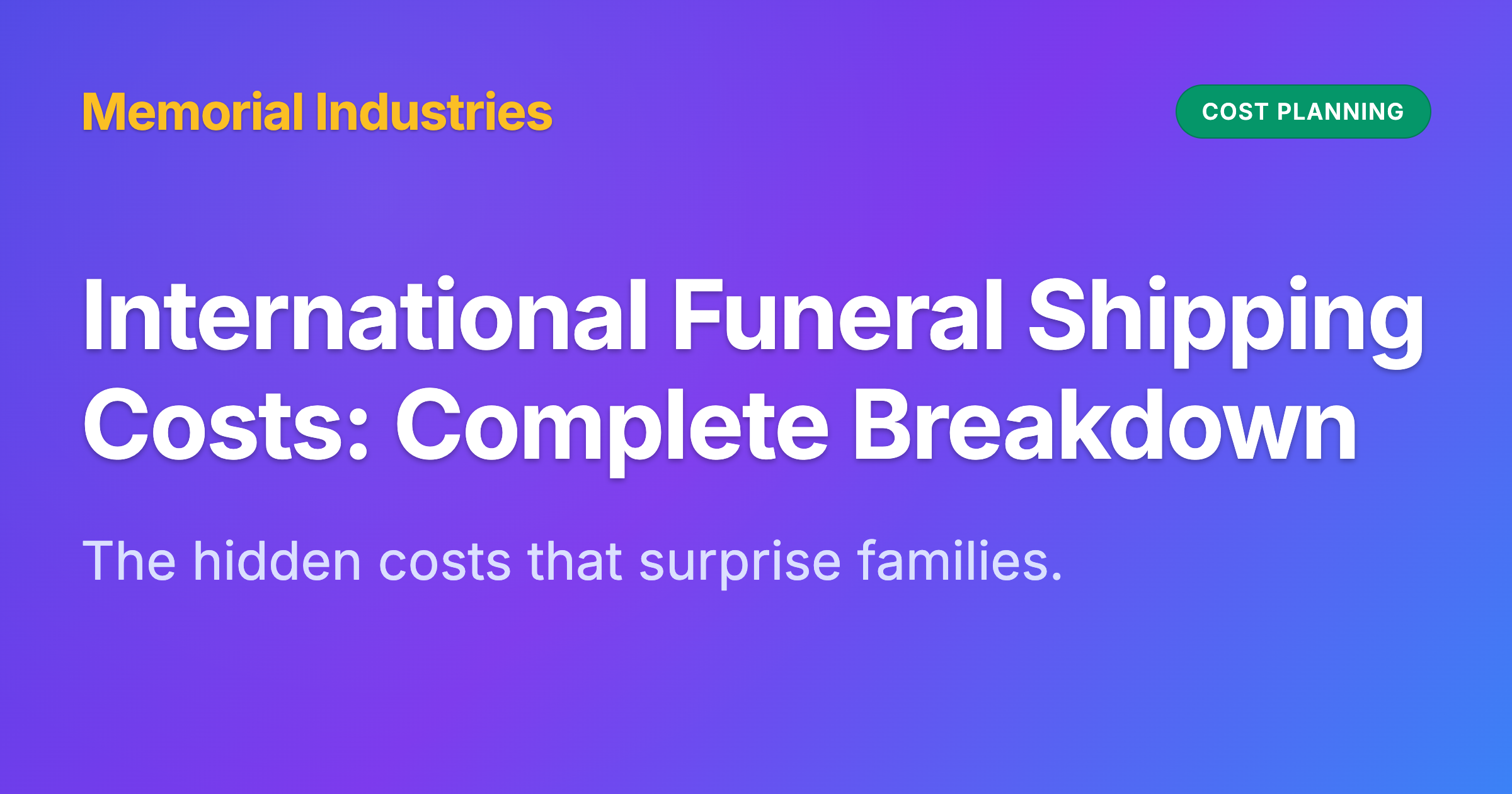
International Funeral Shipping Costs: Complete Breakdown
Jan 28, 2025

Airport-to-Airport vs Door-to-Door Funeral Shipping: Choose the Right Option
Jan 26, 2025
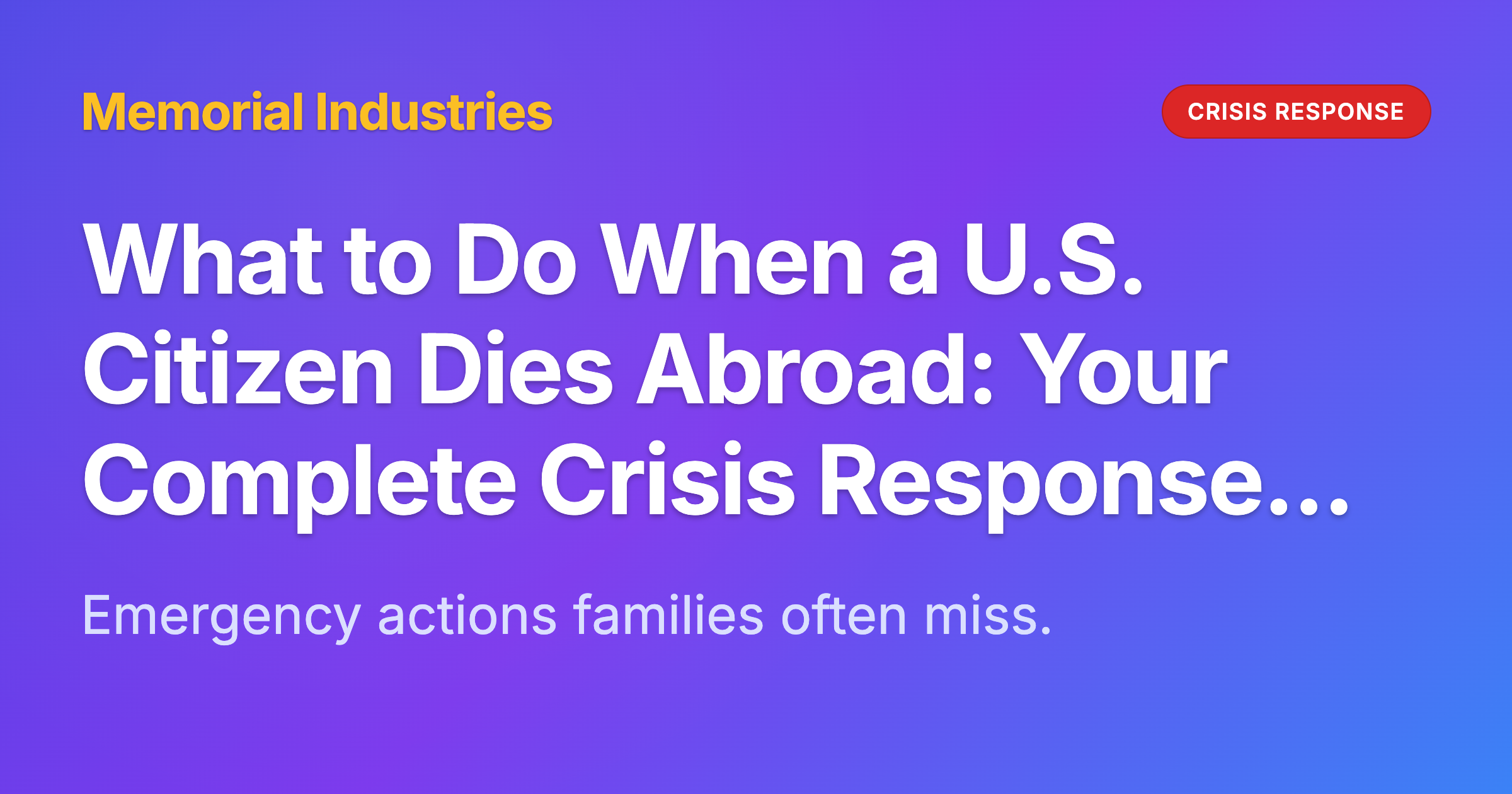
What to Do When a U.S. Citizen Dies Abroad: Your Complete Crisis Response Guide
Sep 8, 2025
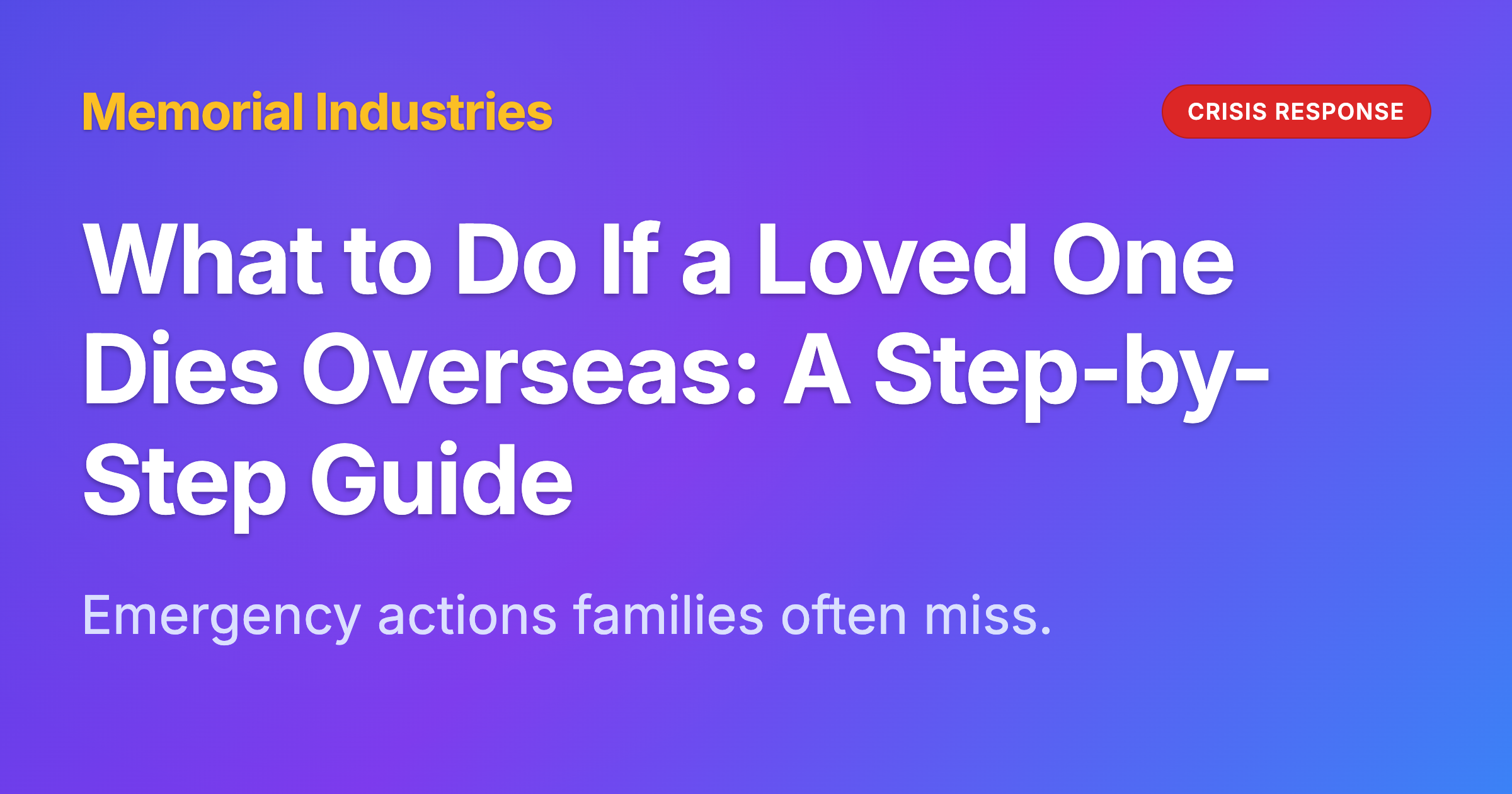
What to Do If a Loved One Dies Overseas: A Step-by-Step Guide
Jan 30, 2025
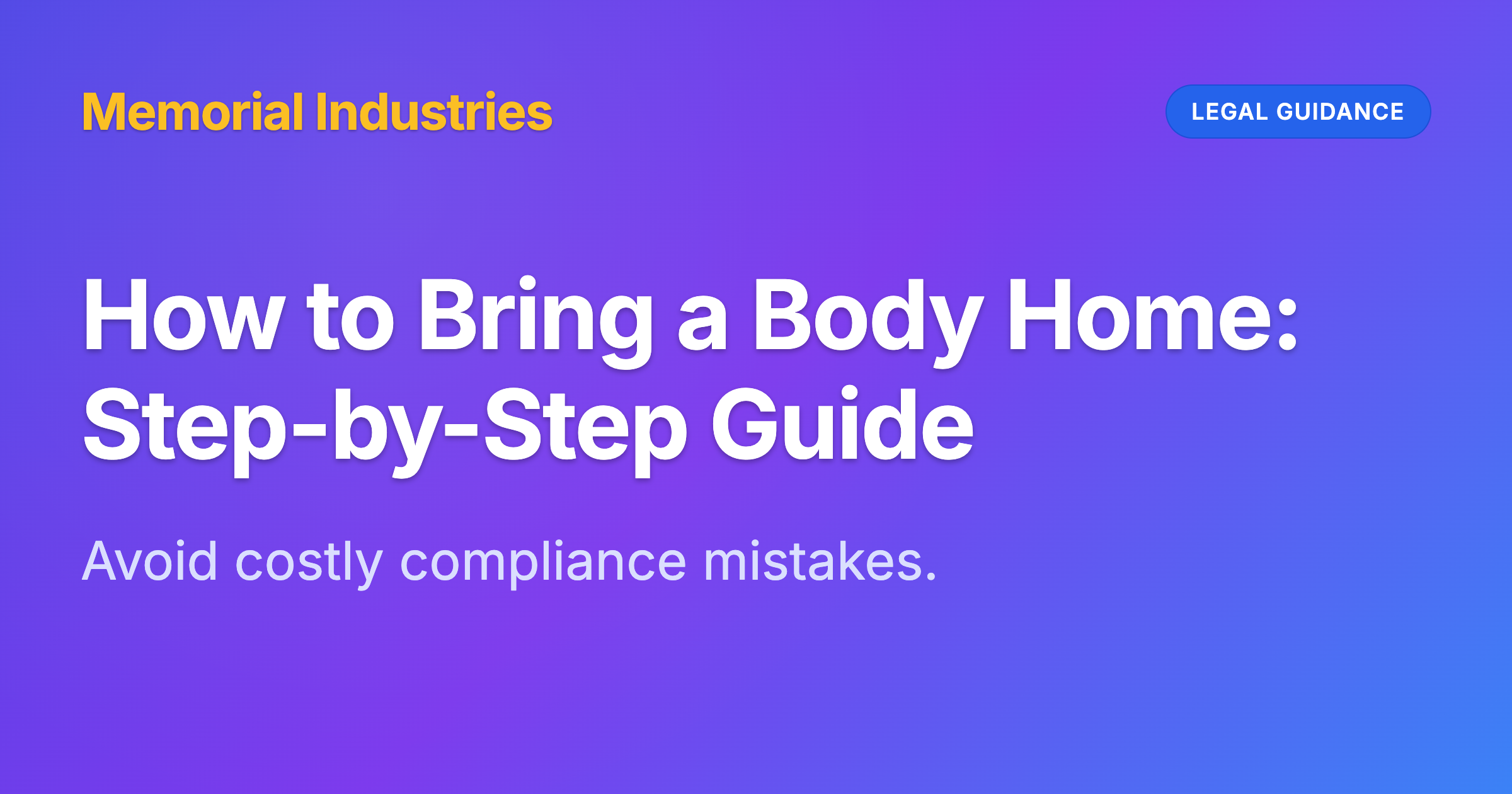
How to Bring a Body Home: Step-by-Step Guide
Jan 29, 2025
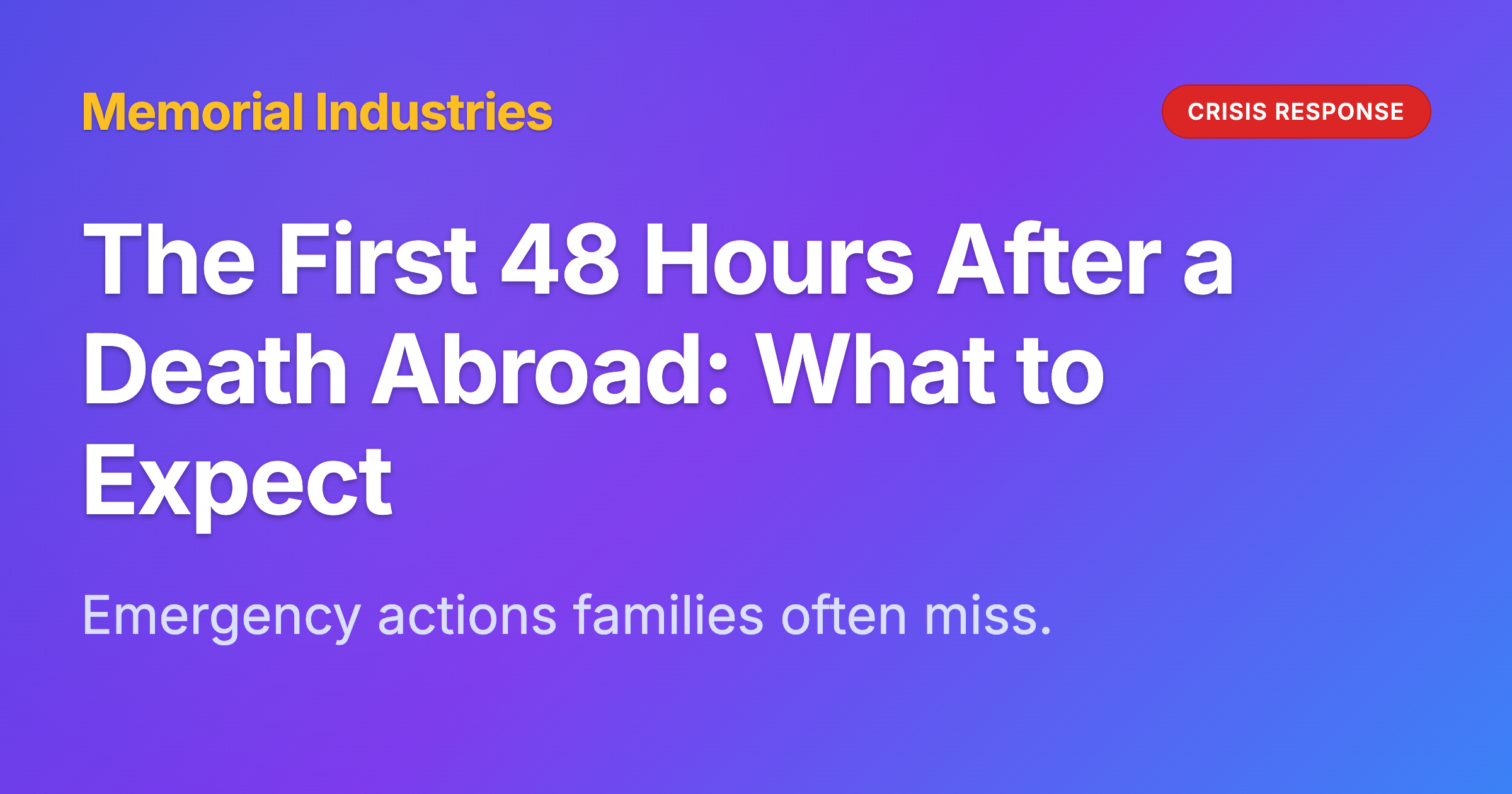
The First 48 Hours After a Death Abroad: What to Expect
Jan 27, 2025